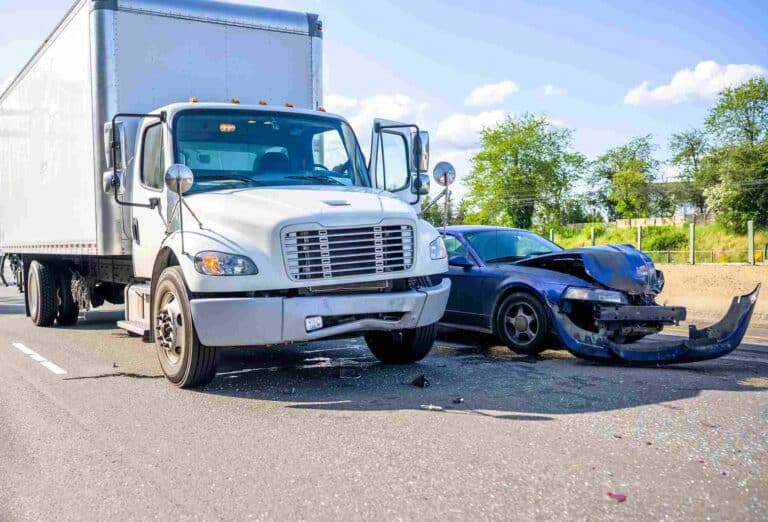Motorcycle accidents can lead to severe injuries or fatalities due to the rider’s exposure to the elements and limited protection. As a reputable law firm in Long Island, The Law Offices of Joseph J. Perrini, III has seen first-hand the devastating aftermath of motorcycle accidents.
Here, you can learn more about the common causes of motorcycle accidents in Long Island and how our lawyers can help with your claim. While this can be a confusing and complicated process, we are here to help each step of the way.
High Speed and Reckless Driving
Many motorcycle accidents result from high speed and reckless driving. These factors contribute to losing control, which can be disastrous on a motorcycle. Motorcyclists should always be aware of their speed and remember that safety should never be compromised for the thrill of a fast ride.
Here, you will find some of the most common causes of serious and often deadly motorcycle accidents in Long Island.
Drunk or Impaired Driving
Drunk or impaired driving continues to be a major concern on roads in Long Island. Riding while intoxicated increases the risk of accidents, often leading to severe injuries or fatalities.
The Impact of Alcohol and Drugs
Alcohol and drugs affect a driver’s ability to operate vehicles safely. They impair critical faculties like judgment, reaction time, coordination, and balance. This impairment is particularly dangerous for motorcyclists, who need these skills to navigate roads safely.
Legal Implications and Consequences
The legal implications of drunk or impaired driving are severe. Laws in New York prohibit driving with a blood alcohol concentration (BAC) of 0.08% or higher. Violations can result in hefty fines, loss of driving privileges, and imprisonment.
Promoting Safety on the Roads
Everyone must understand the dangers of drunk or impaired driving to ensure safety. Abstaining from drinking or using drugs when planning to drive, using designated drivers, or opting for public transport can significantly reduce the risk of accidents. We can make our roads safer for all through awareness and responsible behavior.
Unsafe Lane Changes
Unsafe lane changes by drivers often pose a significant risk to motorcyclists. Given their smaller size and greater maneuverability, motorcycles are easily overlooked, particularly in a driver’s blind spot. While this is true, all drivers are required to share the law, according to New York law.
The Impact of Negligent Driving
A driver failing to signal their intent to change lanes or check their blind spot properly can lead to a dangerous situation for motorcyclists. This negligent behavior can result in sideswiping incidents or forcing motorcyclists to swerve dangerously to avoid a collision.
Educating Drivers and Riders
Education is key in mitigating the risks associated with unsafe lane changes. Drivers must be reminded of the importance of signaling and checking blind spots. Meanwhile, motorcyclists should be aware of the risk zones around vehicles and adopt defensive driving tactics to avoid potential hazards.
Implementing Safety Measures
Both drivers and motorcyclists can implement safety measures to minimize accidents resulting from unsafe lane changes. Drivers can use mirrors and turn their heads to check for motorcyclists. Similarly, motorcyclists can stay out of blind spots, maintain a safe distance from other vehicles, and always be prepared for sudden changes in other vehicles’ directions.
Left-Turn Accidents
Left-turn accidents are among the most common types of motorcycle accidents. They typically occur when a car makes a left turn in front of an oncoming motorcycle.
The Danger of Misjudgment and Oversight
One reason left-turn accidents are so common is the potential for misjudgment and oversight by drivers. Given their smaller size, motorcycles can be easily overlooked or underestimated in speed. This miscalculation can result in a car turning directly into a motorcyclist’s path, leading to a serious collision.
Increasing Awareness and Education
Increased awareness and education among drivers can help mitigate these accidents. Drivers need to be mindful of their surroundings, double-checking for motorcycles before making a turn. Additionally, they must understand that motorcycles may appear farther away and travel slower due to their size, leading to misjudgments.
Safe Riding Practices for Motorcyclists
Motorcyclists, on the other hand, can adopt safe riding practices to avoid left-turn accidents. They can do this by maintaining a safe distance, reducing speed at intersections, using high beams daily, and wearing brightly colored protective gear to increase visibility. Through cooperative efforts, we can reduce the frequency of left-turn motorcycle accidents.
Poor Road Conditions
Motorcyclists face unique challenges when it comes to poor road conditions. Potholes, uneven surfaces, debris, and slick pavement can all contribute to motorcycle accidents.
The Impact of Road Hazards
Due to their two-wheeled nature and lack of stability compared to four-wheeled vehicles, motorcycles are particularly vulnerable to road hazards. An unexpected pothole or patch of gravel can easily destabilize a motorcycle, leading to potential accidents.
The Importance of Road Maintenance
Regular road maintenance is essential to mitigate such accidents. This includes fixing potholes, clearing road debris, and ensuring clear and visible road markings. While infrastructure improvement is a collective responsibility, motorcyclists can play a part by reporting dangerous road conditions to local authorities.
Motorcyclist Vigilance and Preparedness
For motorcyclists, vigilance and preparedness are key. They should always know the road conditions and adjust their speed accordingly. Advanced rider courses can also equip them with the skills to handle unexpected road hazards. Furthermore, investing in suitable gear, such as helmets and protective clothing, can reduce the risk of severe injuries if an accident occurs due to poor road conditions.
Inadequate Training or Experience
Operating a motorcycle requires a unique set of skills. Inadequate training or experience can lead to accidents, as new or untrained riders may struggle with control, fail to recognize hazards or respond inappropriately in emergencies.
The Consequences of Insufficient Skills
Riding a motorcycle is vastly different from driving a car. It requires balance, coordination, and quick reflexes. New riders may not fully understand how to handle their motorcycles without adequate training, particularly in challenging situations like sudden stops, sharp turns, or when encountering road hazards.
The Importance of Motorcycle Training
Formal motorcycle training is vital. It gives riders the necessary knowledge about traffic rules, emergency procedures, and handling techniques. More importantly, training equips riders with defensive driving skills, enabling them to anticipate potential dangers and react accordingly.
Continuous Learning and Experience
Beyond initial training, gaining experience through regular riding in various conditions also helps. With time and experience, riders can learn to better judge speed, distance, and timing, making them safer on the roads. Additionally, seasoned riders should continue learning and keeping updated with new safety measures, technologies, and riding techniques.
Motorcycle Defects
Motorcycle defects represent a less recognized but equally critical factor contributing to accidents. Problems with brakes, tires, or faulty manufacturing can lead to unexpected incidents on the road.
The Consequences of Defective Parts
Faulty brakes can prevent a rider from stopping in time, while defective tires can lead to loss of control or blowouts. Issues with the bike’s design or manufacturing can cause instability or sudden malfunction, resulting in accidents.
The Importance of Regular Maintenance
Regular maintenance is essential to ensure that a motorcycle is in excellent condition. This includes checking tire pressure, tread depth, brake function, fluid levels, and lights. Regular inspections can also detect potential mechanical or structural problems that pose safety risks.
Manufacturer’s Role in Ensuring Safety
Manufacturers play a critical role in ensuring their motorcycles are safe and meet the required safety standards. If a defect is identified, they should issue a recall to repair or replace the faulty component.
Riders’ Responsibility
Riders are responsible for responding promptly to any recalls and maintaining their motorcycles in a safe condition. Vigilance, routine checks, and timely repairs can greatly reduce the risk of accidents due to motorcycle defects.
The Role of Weather Conditions
Weather conditions significantly influence road safety, especially for motorcyclists. Rain, fog, strong winds, or icy conditions can increase the likelihood of motorcycle accidents.
How Weather Affects Riding
Inclement weather can reduce visibility, making it difficult for riders and other motorists to see each other. Wet or icy roads can also diminish tire traction, making the motorcycle harder to control, while strong winds can destabilize bikes, particularly at high speeds.
Preparation and Awareness
Before setting out, motorcyclists should check the weather forecast and plan their route accordingly. If poor weather is anticipated, they should consider alternative modes of transportation or delay their journey until conditions improve.
Safe Riding in Adverse Weather
If riding in poor weather is unavoidable, riders should adapt their riding style. This might include reducing speed, increasing the distance from other vehicles, using lights to increase visibility, and wearing high-visibility gear.
Investing in Proper Gear
Motorcyclists should also invest in weather-appropriate gear. Waterproof clothing, non-slip gloves, and anti-fog visors can enhance comfort and safety when riding in adverse weather.
Understanding the role of weather conditions in road safety can help motorcyclists make informed decisions and adapt their behavior, thus reducing the risk of accidents.
The Importance of Legal Representation
Motorcycle accidents in Long Island often lead to severe injuries and significant financial burdens. Understanding the common causes can help motorcyclists avoid accidents and drive more safely. However, consulting with a skilled personal injury attorney is crucial if you or a loved one has been involved in a motorcycle accident.
At The Law Offices of Joseph J. Perrini, III, we specialize in personal injury law, including motorcycle accidents. We understand the physical, emotional, and financial toll these accidents can take, and we are committed to helping you secure the compensation you deserve. Contact us at (516) 219-1847 for a free consultation today, and let us help you navigate the complex legal process during this challenging time.





